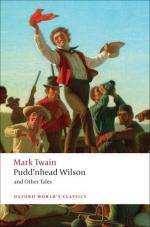[1] It was always my impression that that was what the horse was there for, and I know that it was also the impression of at least one other of the command, for we talked about it at the time, and admired the military ingenuity of the device; but when I was out West three years ago I was told by Mr. A. G. Fuqua, a member of our company, that the horse was his, that the leaving him tied at the door was a matter of mere forgetfulness, and that to attribute it to intelligent invention was to give him quite too much credit. In support of his position, he called my attention to the suggestive fact that the artifice was not employed again. I had not thought of that before.
MEISTERSCHAFT
In three acts [1]
DRAMATIS PERSONAE:
Mr. Stephenson. Margaret
Stephenson.
George Franklin. Annie
Stephenson.
William Jackson. Mrs. Blumenthal,
the Wirthin.
Gretchen, Kellnerin
ACT I. SCENE I.
Scene of the play, the parlour of a small private dwelling in a village. (Margaret discovered crocheting—has a pamphlet.)
Margaret. (Solus.) Dear, dear! it’s dreary enough, to have to study this impossible German tongue: to be exiled from home and all human society except a body’s sister in order to do it, is just simply abscheulich. Here’s only three weeks of the three months gone, and it seems like three years. I don’t believe I can live through it, and I’m sure Annie can’t. (Refers to her book, and rattles through, several times, like one memorising:) Entschuldigen Sie, mein Herr, konnen Sie mir vielleicht sagen, um wie viel Uhr der erste Zug nach Dresden abgeht? (Makes mistakes and corrects them.) I just hate Meisterschaft! We may see people; we can have society; yes, on condition that the conversation shall be in German, and in German only—every single word of it! Very kind—oh, very! when neither Annie nor I can put two words together, except as they are put together for us in Meisterschaft or that idiotic Ollendorff! (Refers to book, and memorises: Mein Bruder hat Ihren Herrn Vater nicht gesehen, als er gestern in dem Laden des deutschen Kaufmannes war.) Yes, we can have society, provided we talk German. What would conversation be like! If you should stick to Meisterschaft, it would change the subject every two minutes; and if you stuck to Ollendorff, it would be all about your sister’s mother’s good stocking of thread, or your grandfather’s aunt’s good hammer of the carpenter, and who’s got it, and there an end. You couldn’t keep up your interest in such topics. (Memorising: Wenn irgend moglich—mochte ich noch heute Vormittag Geschaftsfreunde zu treffen.) My mind is




